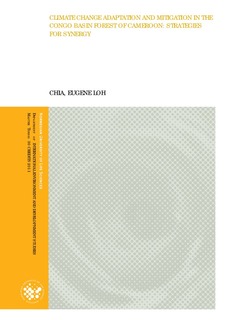| dc.description.abstract | Climate change mitigation through Reduced Emissions from Deforestation and land Degradation (REDD), is dominating climate policy processes in many tropical forests countries. However concerns have been stressed about the implications of these activities for the livelihoods of forest-dependent communities, who are already vulnerable to climatic and non-climatic stresses. Synergizing adaptation and mitigation to exploit win-win opportunities is a necessary but challenging strategy. Build on the concepts of vulnerability, adaptive, mitigative and response capacities this study investigated win-win strategies in two community forests REDD Payment for Ecosystem Services (PES) in Nomedjoh and Nkolenyeng in the Southern and Eastern regions of Cameroon respectively. Furthermore, the role of relevant actors and stakeholders in the design of synergy strategies was also examined.
The study used a combination of surveys (110 households), key-informant interviews and field observations, and secondary sources for data collection. Based on the perceptions and attitudes of forests communities in relation to the conservation projects, the study reveals firstly, that the communities are vulnerable to local climate variability and the PES project is limiting their adaptive capacity. Secondly, on the adaptation side, the adaptive capacity of the communities can benefit directly from guarantee food security and income, the improvement in livelihood diversification, strengthening the viability of local economic activities, knowledge and capacity building of local agriculture systems and alternative livelihood options; and indirectly from the use and access to resources, better tenure arrangements, equity and participation. Thirdly, on the mitigation side, the motivation, incentives and willingness of forest communities to participate in forests conservation activities are influence by factors which are linked to their adaptation needs and the REDD conservation objectives and activities have adaptation opportunities for the forest communities. The two communities show dissimilarity on both the adaptation and mitigation side, due to differences in local socio-economic and governance factors. However, the implication of this dissimilarity on project outcome can only be confirmed after both projects are evaluated. Lastly, the study finds that, designing effective synergetic strategies requires a multisector, multilevel, multiactor approach with emphasis on coordination, communication, collaboration, networking and partnerships. This study concludes that the vulnerability of communities is a point of departure to design strategies that minimised risk on both adaptation and mitigation. | en_US |
